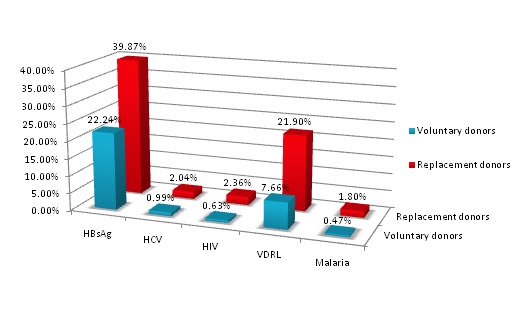An extensive study: to assess the changing trends in prevalence and development of TTIs in non-remunerated blood donors at a tertiary care teaching hospital in Central India
Abstract
Background: Transfusion transmitted infections (TTI) are a major challenge to the transfusion services all over the world. The problem of TTIs is directly proportionate to the prevalence of the infection in the blood donor community which represents the general population. The purpose of this study is to analyze the status of Transfusion transmitted infections among seemingly healthy donors, targeting the non-remunerated blood donors (voluntary and replacement) during the period 2009- 2017.
Material and method: A total of 84,975 blood donors were screened for seropositivity of HBsAg, anti-HCV, HIV, VDRL and malaria antigen at Regional blood transfusion center, in central India.
Result: Out of 84,975 donations, 1906 (2.24%) were sero-reactive for five blood transmitted infections. Among these, prevalence of HIV was 0.067% (57 donors), seroprevalence of HBsAg was 1.39% (1184 donors), HCV showed 0.068% (58 donors), VDRL showed 0.66% (564 donors) and malaria had 0.05% prevalence (43 donors).
Conclusion: HBV is the most common infection among voluntary blood donors, followed by Syphilis. Replacement donors have higher prevalence of TTIs in overall donor population. A change to voluntary blood transfusion service would reduce the chances of post transfusion infections.
Downloads
References
2. Fernandes H, D'souza PF, D'souza PM. Prevalence of transfusion transmitted infections in voluntary and replacement donors. Indian J Hematol Blood Transfus. 2010 Sep;26(3):89-91. doi: 10.1007/s12288-010-0044-0. Epub 2010 Oct 21.[pubmed]
3. NACO: National Blood Policy, National AIDS Control Organization, Ministry of Health and Family Welfare Government of India, New Delhi, 2007 [www.naco.nic.in]
4. Neelam Marwaha: Voluntary blood donation in India: Achievements, expectations and challenges. Asian J Transfus Sci. 2015 Apr; 9(Suppl. 1): S1–S2. doi: 10.4103/0973-6247.157011
5. Global status report on blood safety and availability 2016. Geneva: World Health Organization; 2017.
6. Dushyant Singh Gaur, Gita Negi: Trends of transfusion transmissible diseases among blood donors at Uttarakhand, India. Indian Journal of Community Medicine, Vol. 39, No. 3, July-September, 2014, pp. 183-186
7. R.N. Makroo, Vikas Hegde, Mohit Chowdhry, Aakanksha Bhatia, and N.L. Rosamma Seroprevalence of infectious markers & their trends in blood donors in a hospital based blood bank in North India. Indian J Med Res. 2015 Sep; 142(3): 317–322. [pubmed]
8. Jain R, Jain P, Mahadik V, Choudhury N: Prevalence And Incidence Of Transfusion Transmitted Infections Amongst VNRBDs In Central India. Natl J Integr Res Med, 2015; 6(4): 82-85
9. Garg S, Mathur DR, Garg DK. Comparison of seropositivity of HIV, HBV, HCV and syphilis in replacement and voluntary blood donors in western India. Indian J Pathol Microbiol. 2001 Oct;44(4):409-12.[pubmed]
10. Buseri FI, Muhibi MA, Jeremiah ZA. Sero-epidemiology of transfusion-transmissible infectious diseases among blood donors in Osogbo, south-west Nigeria. Blood Transfus. 2009 Oct;7(4):293-9. doi: 10.2450/2009.0071-08.[pubmed]
11. Tulika Chandra, S. Nishat Fatima Rizvi, and Devisha Agarwal: Decreasing Prevalence of Transfusion Transmitted Infection in Indian Scenario. The Scientific World Journal Volume, 2014, Article ID 173939, 4 pages
12. N Kocak, S Hepgul, S Ozbayburtluet al: Trends in Major Transfusion-transmissible Infections among Blood Donors over 17 Years in Istanbul, Turkey The Journal of International Medical Research, 2004; 32: 671 – 675
13. Pallavi P, Ganesh CK, Jayashree K, Manjunath GV. Seroprevalence and trends in transfusion transmitted infections among blood donors in auniversity hospital blood bank: a 5 year study. Indian J Hematol Blood Transfus. 2011 Mar;27(1):1-6. doi: 10.1007/s12288-010-0047-x. Epub 2010 Dec 14.[pubmed]
14. Chandekar SA, Amonkar GP, Desai HM, Valvi N, Puranik GV. Seroprevalence of transfusion transmitted infections in healthy blood donors: A 5-year Tertiary Care Hospital experience. J Lab Physicians, 2017; 9:283-7.
15. Choudhury N, Ramesh V, Saraswat S, Naik S: Effectiveness of mandatory transmissible diseases screening in Indian blood donors. The Indian Journal of Medical Research, 1995.[01 Jun 1995, 101:229-232]
16. Arora D, Arora B, Khetarpal A. Seroprevalence of HIV, HBV, HCV and syphilis in blood donors in Southern Haryana. Indian J Pathol Microbiol. 2010 Apr-Jun;53(2):308-9. doi: 10.4103/0377-4929.64295.[pubmed]
17. Ness PM: Bacterial and protozoal infections transmitted by transfusion. In: Principles of Transfusion Medicine. EC Rossi , TL Simon , GS Moss, (Eds.), 1st Edn; Williams & Wilkins, Baltimore, 1991: pp.611-618.
18. K. Park. Epidemiology of Communicable Diseases In: Park’s Textbook of Preventive and Social Medicine, 24th edition, Bhanot Publishers, 2017, p.271.



 OAI - Open Archives Initiative
OAI - Open Archives Initiative


